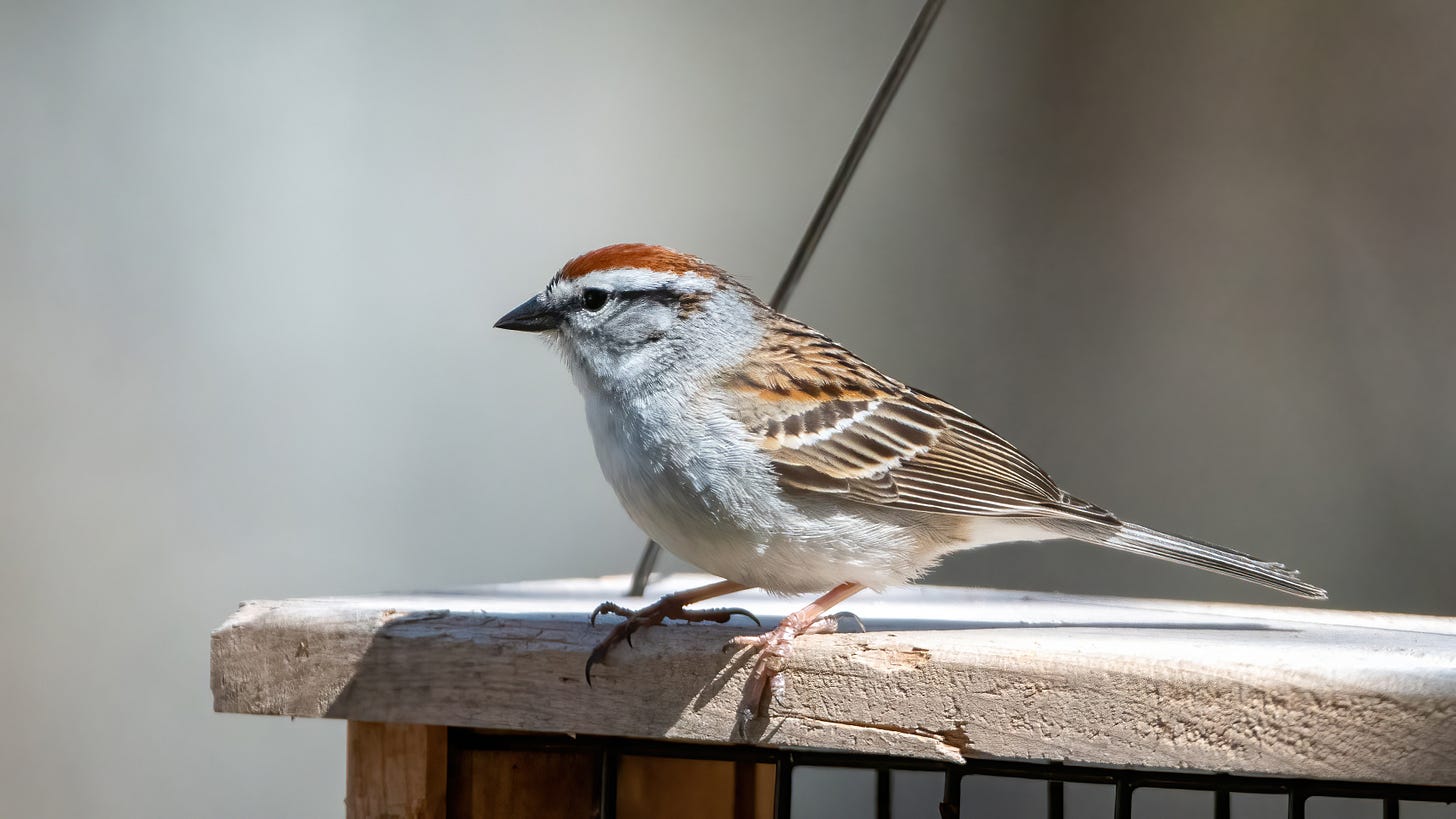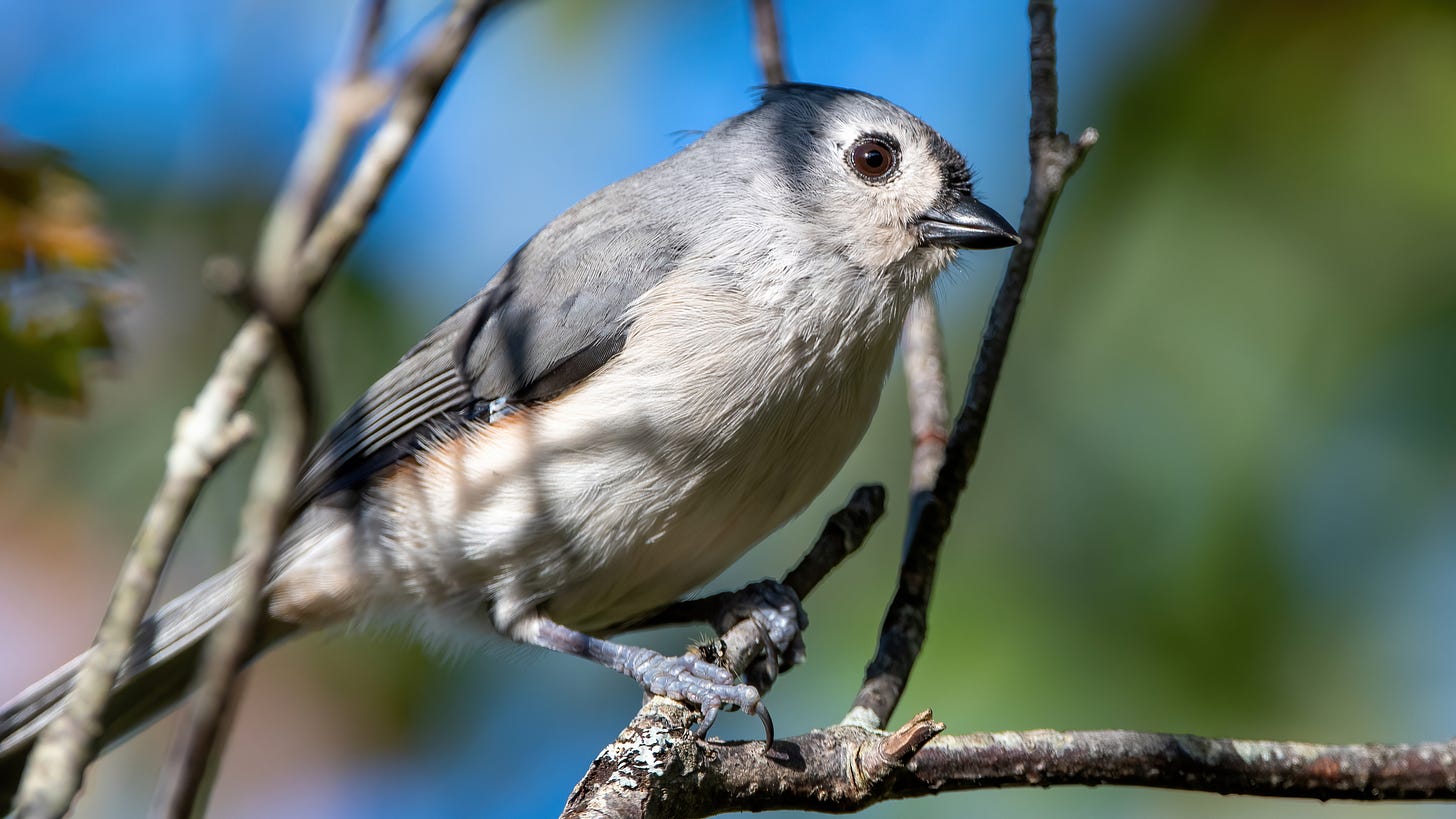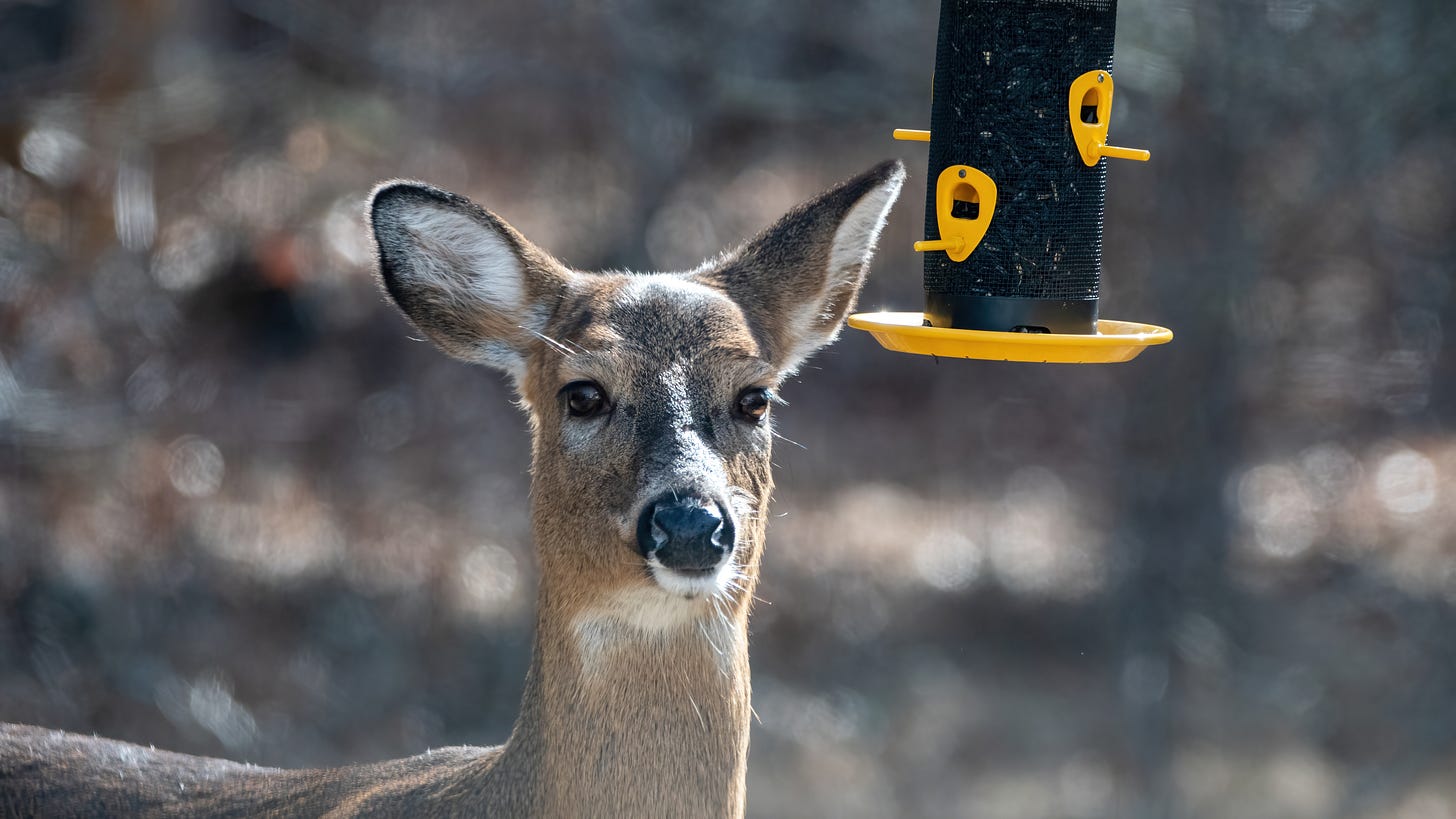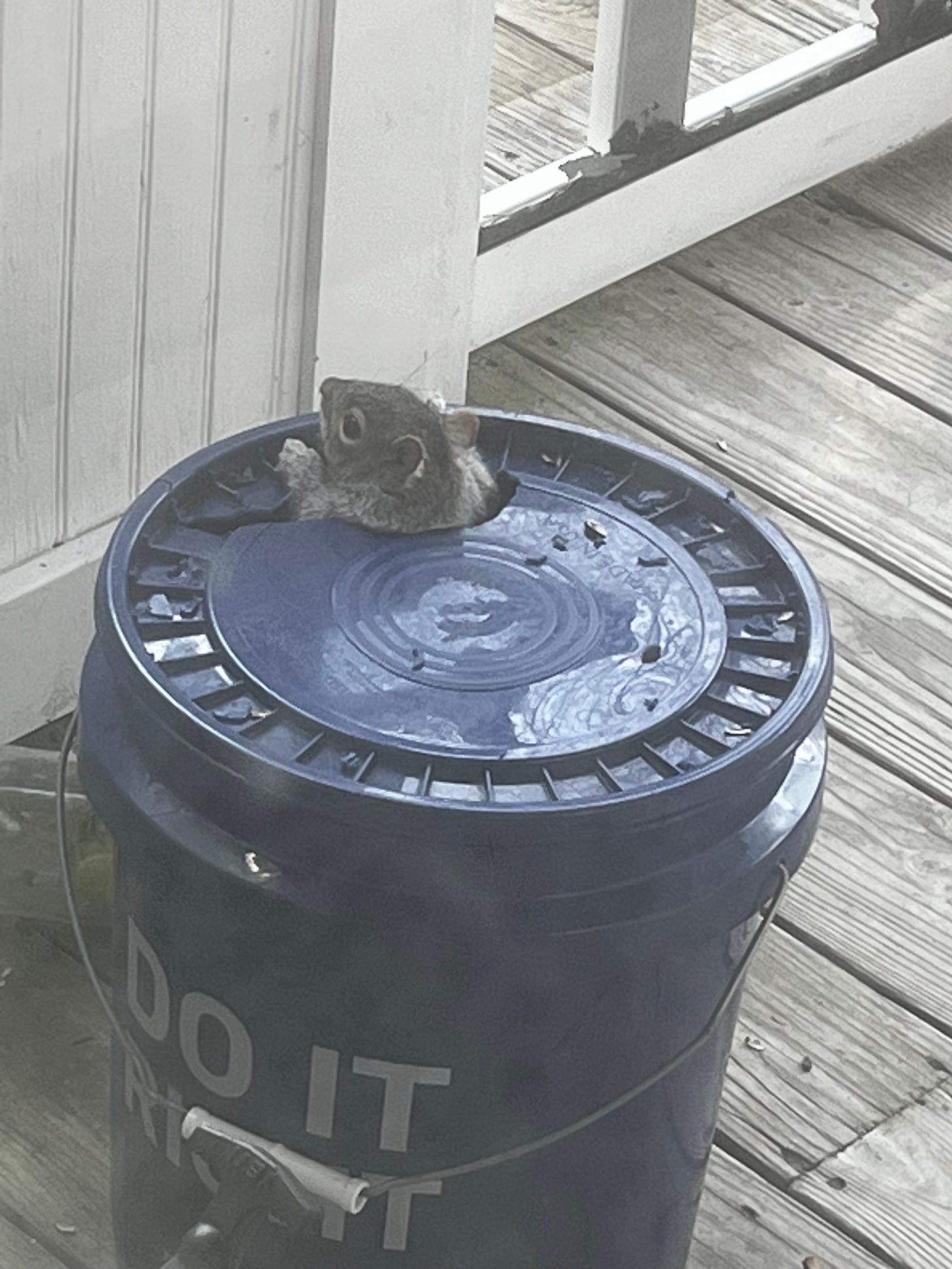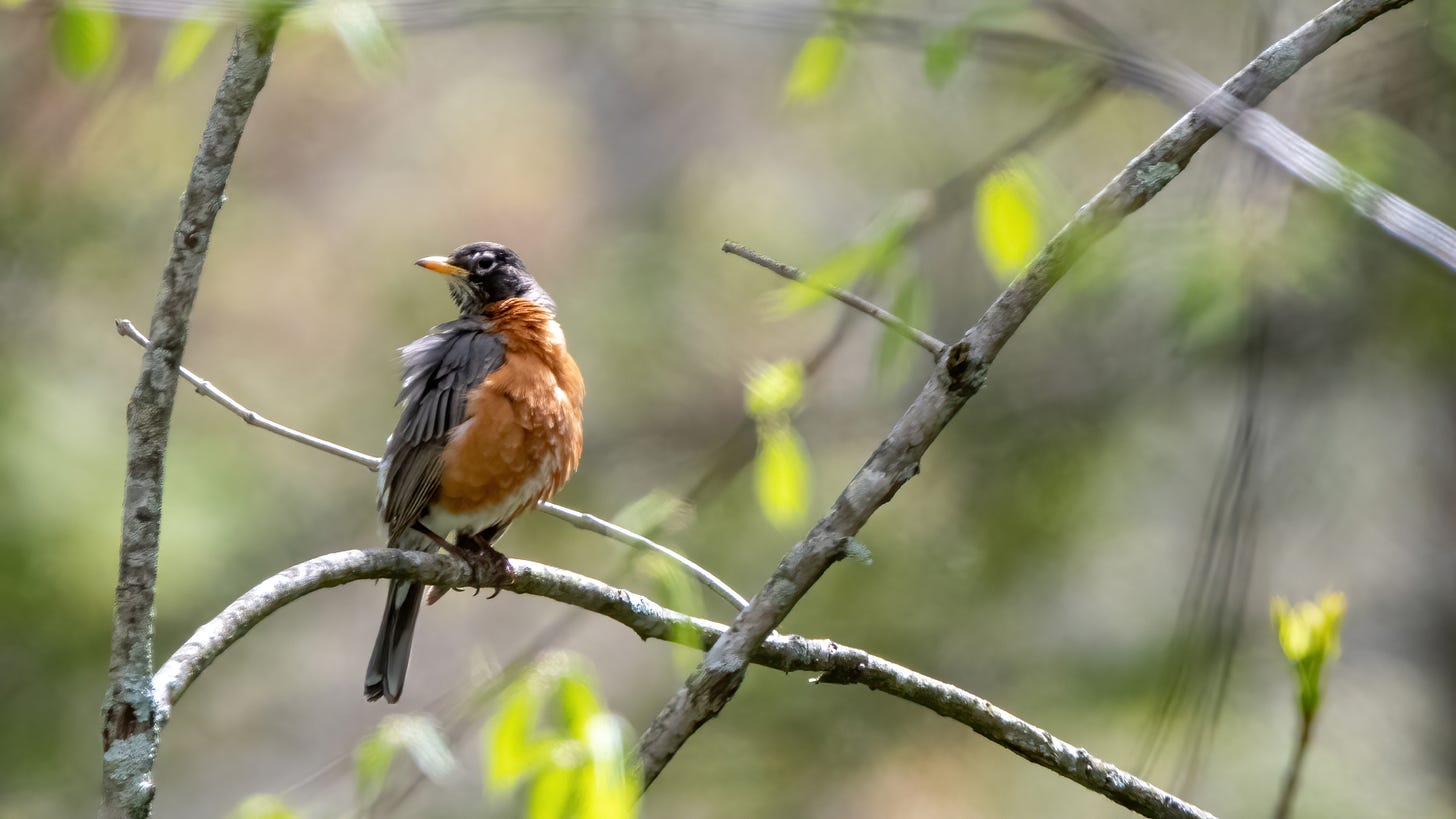Spend enough time looking into the trees—looking outside and seeing the same woodchuck, or a resident buck with a telltale drop tine, maybe a woodpecker has taken an interest in the side of your house—and you’ll get to know the animals around you. The ones you commonly brush shoulders with. Birds, squirrels, deer, whatever’s there.
This, even when it means a woodpecker is boring holes in your house, is a privilege.
I’ve written some poems about this over the years.
It’s easy to catch yourself falling into the trap of being underwhelmed by certain species because you’re used to them, because seeing them doesn’t compete with the thrill of spotting a long-awaited vireo or a Razorbill.
In an older post, I talk about the bad habit of saying a common bird is just whatever species it is:
If we cannot love, know, or care about that which is close to us, that which is common, how can we expect to love the things we may never know or see?
A specific moment comes to mind, walking past a Great Blue Heron. I thought to myself: It’s just a heron. That thought wasn’t incorrect. It was a heron. The issue, aside from the word “just,” was the tone with which I thought it.
A Great Blue Heron. A Black-capped Chickadee. Nice morning light on a field. The colors of the earth melding with the colors of a salt pond.
Seeing a Great Blue Heron is not as objectively exciting as identifying a Prairie Warbler by sound, or watching a Brown-headed Cowbird in the midst of some egg debauchery (brood parasites, they don’t build nests, they lay eggs in other birds’ nests).
The fact of the matter is everyday life isn’t that objectively exciting.
If you only permit yourself to feel good in exceptional moments then you’re going to end up, more often than not, feeling bad. When you see a Blue Jay, an American Robin, or a Tufted Titmouse, allow yourself to smile at it.
Here is a poem, which I never titled. Everything I’ve written above can serve as a title.
You’ve seen it so often
that it isn’t so exciting, it’s crossed
your path more times than
you can count—a blue jay, maybe, a great
blue heron, a red-winged blackbird or a
song sparrow—to the point that for a time
you mentally disregarded it. But really
how fortunate to have such
frequent run-ins—with a blue jay, a great
blue heron, a red-winged blackbird, a song
sparrow—to essentially think nothing of it;
this creature whose significance is
so much greater than nothing, who has
lost its aversion to your company.
I hope that wasn’t so bad. I still feel weird about occasionally including poems here. When I gain comfort with people I read some to them. It feels good to acknowledge and share that side of me.
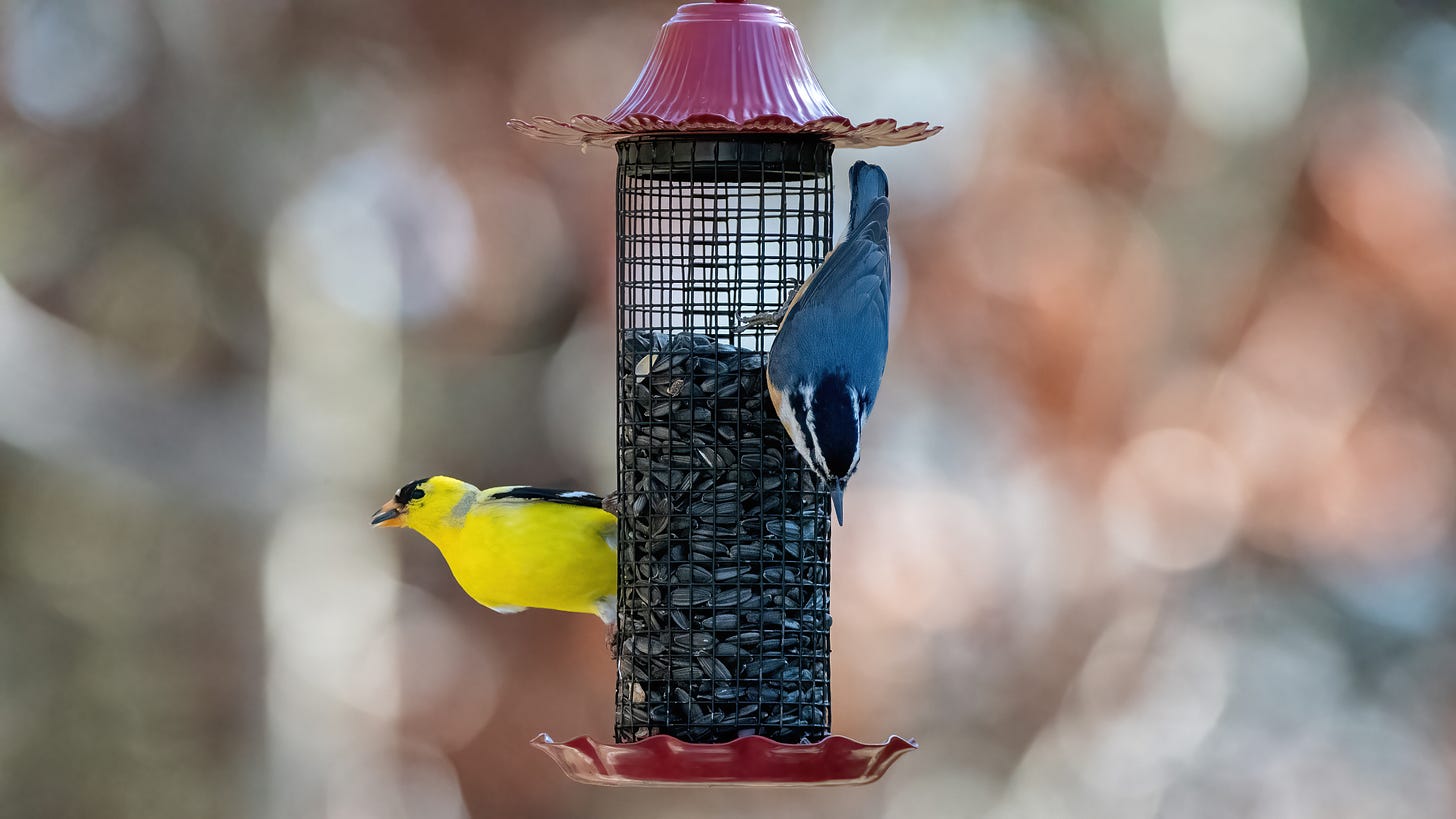
Same with fiction. I have hundreds of pages of short stories I’ve done nothing with and still keep largely to myself—except when I share them with willing and trustworthy audiences.
I’m kind of embarrassed to even admit there was a good chunk of my life where I wrote short stories compulsively—and not about birds or deer. About people, human problems. Marriages, anxieties, death and mourning, friendships, parent-child dynamics—even little league baseball.
I have an ever in-progress assemblage of loosely interrelated stories that all take place in the same setting with the same characters, other discreet connections. One story, for example, is about a barber; that barber’s barbershop is a landmark in another.
That said, please try to heed the main takeaway of that poem. There might come a time of year when you can’t go outside without hearing a Red-winged Blackbird, where Song Sparrows seem a dime a dozen, but they are both still great to be able to hear and see.
Further below is another poem I wrote when my bird feeders were my life. Again, no title.
Remote work was a defining aspect of those days, the pandemic, but the feeders were maybe the defining aspect. I worked at my laptop and kept them within view. Suet feeders, normal feeders, a seed cake feeder. As I said, they were my life. Somebody warned me they might entice mice, but they didn’t. Aside from squirrels—par for the course—and birds, only deer were enticed. They were welcome guests and remain so.
I talked about my feeders and the birds on video calls. If I had to rank the goings-on in my life at that time, the feeders would be near the top. It was an odd stretch. To bide my time, I built a table out of scrap material. A lumber and Starboard collage with a sprinkling of deck screws. It is a capable base upon which to fillet fish. I showed it to my friend and he, in an act of high praise, said it reminded him of something an artist we both like might make.
They say not to anthropomorphize but perhaps now I’ve spent so much time with the chickadees and the nuthatches—more than with people—that they’ve dehumanized me: maybe now I understand them. When there’s no buzz about the feeders, I go outside to check the seed. I’ve found that often the feeders are still full. But the birds descend anyway, they seem to eat in response to me. I arrive, as do they.
As I said, the bird feeders also bring in some deer, so here's a poem I wrote after a run-in with one—or, more accurately, a “hop-through” to see one.
Morning In The Porch I have not put the screens in because this way there is no barrier between the birds and me. Sometimes they come sit. One lands, looks around, backward, sideways; forward it leans, and is off. Its wings sound frantic— pft pft pft pft pft. Like the sound: spitting shells of sunflower seeds in quick succession. Another follows, same species it looks around, backward, sideways; forward it leans, and is off. A rustling to my right—Oh, goodness! How beautiful! I say. Who am I speaking to? A fawn. Alone. Looking back at me over her shoulder. I jump through the unscreened window; she doesn’t startle. Closer, closer, barefoot in nothing but underwear—agh! Standing in poison ivy. I will pay for this. But I must get closer! She trots away but it is fine, just fine. I watch her little white tail.
And I will end with this one.
In Defense of Common Animals
At what point did rarity
become synonymous
with value? We take for granted
the chickadees and the robins;
the garter snakes and the crows.
The sunfish pond
is the province of children—
they are so easy to catch,
you can tie whatever on
a hook and they will bite.
And so what?
This has been a repetitive and long-winded way of explaining that the animals you come to see often and know well are still exciting.
Let them excite you. I say “let them” because it really is up to you. The more often you see them, the more unremarkable they become to you—but this is not to say that they are not remarkable. They certainly are; you just have to allow yourself to recognize that you might see Robins every day, but that doesn’t mean they’re not worth happily acknowledging. It’s a choice, up to you.
It’ll feel unnatural. Like doing something that’s become routine or commonplace and getting all excited about it. Making the same two pieces of toast you make every morning and thinking, holy shit that toast looks sublime. Putting on a pair of jeans you wear all the time and thinking, these jeans are incredible, my goodness!
But if that toast or those jeans take the form of a backyard bird, it’s worth getting excited. Most people aren’t going to routinely have run-ins with a Townsend’s Warbler. They’re likely not going to know there’s such a thing as a Townsend’s Warbler. Most people are going to see chickadees, maybe a nuthatch. This doesn’t mean that birds shouldn’t provide joy for them. It’s up to the person to allow that joy.
Find the exceptional in the “unexceptional. Maybe you’ll find, at least with the animals you see, that the “unexceptional” doesn’t exist at all.






